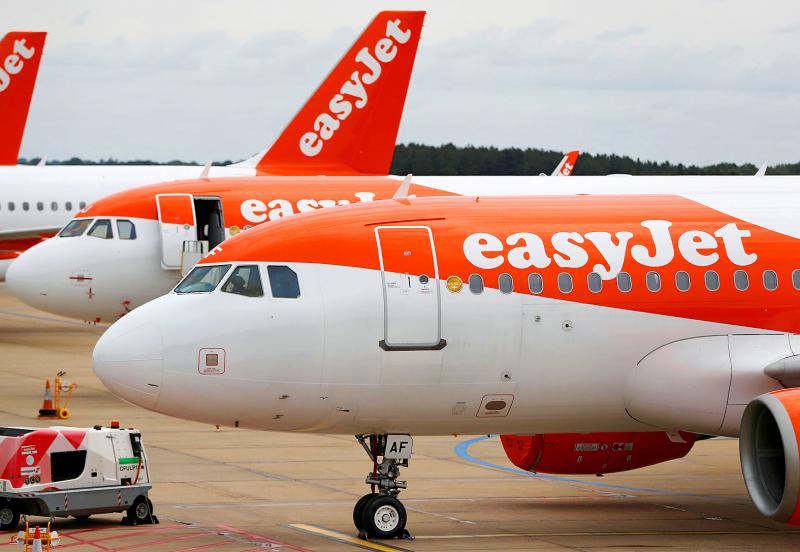Airbus SE last month delivered 39 aircraft while avoiding order cancelations as it battles to keep revenue flowing in a market battered by the COVID-19 pandemic.
Last month’s handovers comprised 35 A320-series narrow-body planes and four twin-aisle jets, the Toulouse, France-based company said late on Tuesday.
The overall tally is down 10 planes from July.

Photo: Reuters
Boeing Co said it delivered 13 planes last month, in an update overshadowed by news that handovers of the 787 Dreamliner are to be slowed for checks for a new manufacturing flaw involving gaps in the plane’s horizontal stabilizer that are wider than specified.
Airbus deliveries have so far held up better during the pandemic than its US rival. Boeing continues to wrestle with cancelations of its 737 MAX short-haul plane, grounded last year following two deadly crashes.
The European company has generally managed to persuade airlines including EasyJet PLC and Qatar Airways to defer deliveries rather than walk away from orders outright.
Deferrals might pick up as the virus continues to roil the sector, with new flareups across Europe pushing carriers there to rein in already modest planes for restoring capacity.
Airbus customers that accepted handovers last month included Gulf Air, which took its first A321neo, and Portuguese carrier Orbest, which received an initial A330-900 wide-body.
New sales remain rarities, with Airbus reporting an order for just one new plane, a corporate version of the A320, and Boeing eight.
In related news, China’s International Aviation and Aerospace Exhibition, the country’s biggest airshow, scheduled for November, has been canceled due to the pandemic, the organizer said yesterday, adding that the next one would take place in 2022.
As the global industry reels from the devastating effects of the pandemic, many Western aerospace firms have reduced budgets and some were not planning to attend the airshow in Zhuhai if it had gone ahead, company sources said.
It follows the cancelation of this year’s largest aerospace expo, the UK’s Farnborough International Airshow, because of travel curbs and an industry downturn resulting from the pandemic.
Additional reporting by Reuters

Taiwan Transport and Storage Corp (TTS, 台灣通運倉儲) yesterday unveiled its first electric tractor unit — manufactured by Volvo Trucks — in a ceremony in Taipei, and said the unit would soon be used to transport cement produced by Taiwan Cement Corp (TCC, 台灣水泥). Both TTS and TCC belong to TCC International Holdings Ltd (台泥國際集團). With the electric tractor unit, the Taipei-based cement firm would become the first in Taiwan to use electric vehicles to transport construction materials. TTS chairman Koo Kung-yi (辜公怡), Volvo Trucks vice president of sales and marketing Johan Selven, TCC president Roman Cheng (程耀輝) and Taikoo Motors Group

Among the rows of vibrators, rubber torsos and leather harnesses at a Chinese sex toys exhibition in Shanghai this weekend, the beginnings of an artificial intelligence (AI)-driven shift in the industry quietly pulsed. China manufactures about 70 percent of the world’s sex toys, most of it the “hardware” on display at the fair — whether that be technicolor tentacled dildos or hyper-realistic personalized silicone dolls. Yet smart toys have been rising in popularity for some time. Many major European and US brands already offer tech-enhanced products that can enable long-distance love, monitor well-being and even bring people one step closer to

New apartments in Taiwan’s major cities are getting smaller, while old apartments are increasingly occupied by older people, many of whom live alone, government data showed. The phenomenon has to do with sharpening unaffordable property prices and an aging population, property brokers said. Apartments with one bedroom that are two years old or older have gained a noticeable presence in the nation’s six special municipalities as well as Hsinchu county and city in the past five years, Evertrust Rehouse Co (永慶房產集團) found, citing data from the government’s real-price transaction platform. In Taipei, apartments with one bedroom accounted for 19 percent of deals last

RECORD-BREAKING: TSMC’s net profit last quarter beat market expectations by expanding 8.9% and it was the best first-quarter profit in the chipmaker’s history Taiwan Semiconductor Manufacturing Co (TSMC, 台積電), which counts Nvidia Corp as a key customer, yesterday said that artificial intelligence (AI) server chip revenue is set to more than double this year from last year amid rising demand. The chipmaker expects the growth momentum to continue in the next five years with an annual compound growth rate of 50 percent, TSMC chief executive officer C.C. Wei (魏哲家) told investors yesterday. By 2028, AI chips’ contribution to revenue would climb to about 20 percent from a percentage in the low teens, Wei said. “Almost all the AI innovators are working with TSMC to address the